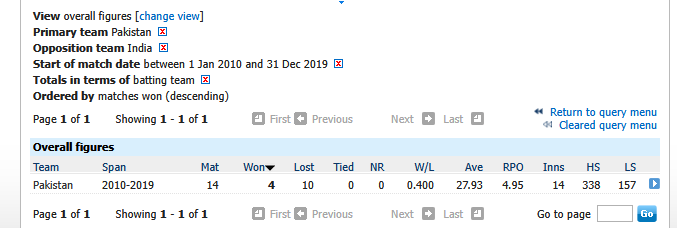Pakistan cricket in the 1990s was wild. A strong case can be made that the team underachieved. But I have real fondness for that team in that decade: their obvious flaws and their obvious vulnerabilities just made them more absorbing to follow.
I think there is a part of us that revolts against the over-engineered and the predictable. There is a part of us that wants to experience enchantment. This was Pakistan cricket gave us in the 1990s.
There is no doubt Pakistan cricket was a very messy affair in the 1990s, but messiness can sometimes create space for creativity. A maverick can sometimes show us what we have not yet discerned.
It was not to last of course. We might mark the symbolic end of that era as occurring on 20 June 1999. The following day, the columnist for the Times, Simon Barnes, wrote the following piece:
Fragile talents prove forever intoxicating
Watching Pakistan is what sport is all about. In some moods, I would be prepared to say that I prefer watching Pakistan to anything else in sport. I have not quite got the heart for that today, but Pakistan capture all that is most beguiling, intoxicating and addictive about sport.
Also depressing - but then depression has always been one of sport's less trumpeted pleasures, as any football supporter, or follower of the England cricket team, will tell you.
There are certain performers who possess something other than mere brilliance. I remember years ago watching Laurence Olivier going nuts in Strindberg's Dance of Death. You were never quite certain that he wasn't going to leap into the audience and start slaying people left and right. Or collapse in a terrible terminal seizure. Or perhaps lose the plot completely, forget his lines, do something quite toe-curlingly embarrassing. What he possessed above all was that sense of danger. Tension filled his every move.
Muhammad Ali had that in sport, so did John McEnroe, Ayrton Senna and Eric Cantona, which was an aspect of their watchability. In fact, one of them did leap into the audience and lay about him.
Players like this excite more than an awed and fearful response to danger. They also invoke an anxiety, a fear not just for oneself, but also for the dangerous performer himself. They compel an odd mixture of fear and tenderness. You sense the fine balance, the precarious nature of this very special kind of talent.
It is rare enough to find such a thing in an individual. Lord knows, the four I have named are pretty rare types. It is, I think, quite unique to find it in a team. Yet you find it in Pakistan cricket teams from generation to generation.
In 1992, Pakistan were losing their way in the World Cup, heading for humiliation. Imran Khan, their captain, unforgettably told his men to play like cornered tigers. Wasim Akram said something similar yesterday when his boys came out to try to bowl Australia out for nothing. You could feel the tension, the resolve to find that wild warrior inspiration that is the Pakistan speciality.
I keep a breed of bantam called Golden Sebrights. They are notorious for their tendency to hysterical panic. Yesterday, alas, Pakistan played like cornered Golden Sebrights. But that is Pakistan for you. The great thing about sport is that you don't know what happens next. Where Pakistan are concerned, you cannot even begin to make a guess. Tigers, bantams - they make the transition from one to the other with effortless ease.
They have lit up this World Cup. They, more than any other side, have brought brilliance to the tournament. They have shown England just how good a game, how enthralling cricket can be . . . as long as England are not playing.
Shoaib Akhtar has been the player of the tournament: that rare thing, a cricketer you daren't take your eyes off, in anything he does, from that wild, stirring run to those elegantly petulant gestures of his pianist's fingers. He is a player capable of exploding batsmen out - or, like yesterday, of getting hammered.
Saeed Anwar has been almost equally watchable, batting with left-handed brilliance, a nostalgic, sepia-tinted replay of David Gower. Yesterday, we saw a Gower-like cameo: a few scorching shots of minimal force and maximal grace, followed by a tame dismissal.
Wasim himself, captain of Pakistan for the third time, oscillates between hero and villain in his home country. He did all he could to win this match as a leader and on his own. Nothing worked. Let us be frank it was desperate stuff.
The performance of Pakistan and, for that matter, the following that they and the other three subcontinental sides have attracted has shown us how the future of cricket is all tied up with the sub-continent . . . and how the future of England cricket is tied up with English people of sub-continental extraction.
How much longer will it be before a person with roots in India or Pakistan becomes England captain? About five days, since you ask. Nasser Hussain should be confirmed in the post before the week is out.
Pakistan played some great matches and some dreadful ones, losing to Bangladesh and also, alas, at the last. Their fragility is an aspect of their talents; the tethered goat, the Golden Sebright, the rampant tiger. With Pakistan, it seems, you cannot have one without the other.
They bring that sense of danger, that sense of the fragile, fleeting nature of sport and its joys and sorrows. I cannot wait to watch them again.
June 21, 1999











